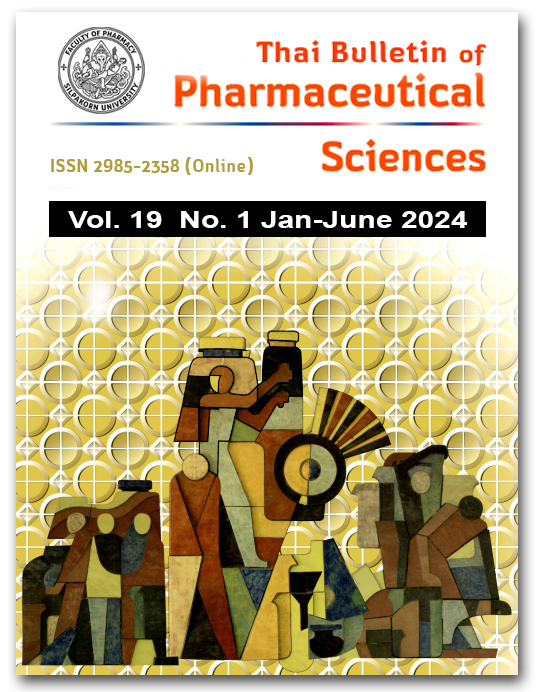RELATIONSHIP BETWEEN HEALTH LITERACY AND GLYCEMIC CONTROL OF DIABETES PATIENT IN TAMBON HEALTH PROMOTION HOSPITAL OF PHRACHOMKLAO HOSPITAL SERVICES NETWORK, PHETCHABURI
DOI:
https://doi.org/10.69598/tbps.19.1.67-82Keywords:
Health Literacy of Diabetes Patient, Diabetes, glycemic controlAbstract
This cross-sectional analytical study evaluated health literacy in order to determine the relationship between personal factors and health literacy related to glycemic control in 340 patients with type 2 diabetes mellitus in 10 Tambon Health Promotion Hospitals of the Phrachomklao Hospital Services Network, Phetchaburi Province. Participants in this study were chosen by employing the accidental sampling method. Data were collected by using a questionnaire and gathering participants’ hemoglobin A1c (HbA1c). Descriptive analysis and inferential statistics were employed to analyze the data, including percentage, mean, standard deviation, Chi-square test, and binary logistic regression. The results revealed that 74.1% of the sampling group were female, with an average age of 61.4 years, and 68.8% of them had an educational level equivalent to primary school or less. Their average body mass index was 26.0 kg/m2 with the underlying disease at 46.2%. They received treatment for diabetes for an average of 7.2 years. Most participants, on average 66.8%, had a high level of health literacy, and 60.6% were able to control their glycemic levels (HbA1c < 7%). The health literacy of diabetic patients (OR = 3.5; 95% CI = 2.1-5.8; p = <0.001) and diabetic patients who had participated in the health education activities group at Tambon Health Promotion Hospitals (OR = 1.9; 95% CI = 1.1-3.2; p = 0.020) showed a statistically significant association with glycemic control. Therefore, health professionals should assess the health literacy of patients with diabetes. Emphasis is placed on developing a high-level of understanding of health-related information to effectively control patients’ blood sugar levels.
References
International Diabetes Federation. Global diabetes data report 2000-2045 [Internet]. 2021 [cited 2023 July 9]. Available from: https://diabetesatlas.org/data/en/world/
Rattarasarn C. Current situation and cooperation to reform diabetes care in Thailand [Internet]. 2017 [cited 2021 Jan 5]. Available from: https://www.novonordisk.com/content/dam/Denmark/HQ/sustainablebusiness/performance-on-tbl/more-about-how-we-work/Creating%20shared%20value/PDF/Thailand%20Blueprint%20for%20Change_2017_TH.pdf (in Thai)
Diabetes Association of Thailand. Diabetes in adolescents [Internet]. 2019 [cited 2021 Nov 9]. Available from: https://www.hfocus.org/content/2019/11/18031 (in Thai)
Division of Non-Communicable Disease, Department of Disease Control, Ministry of Public Health. World diabetes campaign Issues [Internet]. 2018 [cited 2021 Jan 19]. Available from: http://www.thaincd.com/document/docs_upload/WorldDiabetesday61.pdf (in Thai)
Division of Non-Communicable Disease, Department of Disease Control, Ministry of Public Health. National strategic plan for prevention and control of non-communicable disease (2017-2021) [Internet]. 2018 [cited 2020 Oct 13]. Available from: http://thaincd.com/2016/mission/activitydetail.php?id=13065&tid=31,15&gid=1-015-005 (in Thai)
Diabetes Association of Thailand. Insulin resistance [Internet]. 2020 [cited 2020 Oct 13]. Available from: https://dmthai.org/old/index.php/knowledge/understand-diabetes/diabetes-2/497-insulin-resistance (in Thai)
Tanasugarn C, Roma W, Samnaunklang M. Principles of the health litracy organization: Concept. 1st. Bangkok: Office of DOH 4.0 and Health Litetacy; 2018. (in Thai)
Health Education Division, Department of Health Service Support, Ministry of Public Health. Strengthening and assessing health literacy and health behaviors, children and youth groups (7-14 years old), people aged 15 years and over, revised edition 2018. Bangkok: New Thammada Press (Thailand); 2018. (in Thai)
Bailey S, Brega A, Crutchfield T, Elasy T, Herr H, Kaphingst K, et al. Update on health literacy and diabetes. Diabetes Educ. 2014;40(5):581-604.
Schillinger D, Grumbach K, Piette J, Wang F, Osmond D, Daher C, et al. Association of health literacy with diabetes outcomes. JAMA. 2002;288(4):475-82.
Osborn C, Bains S, Egede LE. Health literacy, diabetes self-care, and glycemic control in adults with type 2 diabetes. Diabetes Technol Ther. 2010;12(11):913-9.
Bains S, Egede L. Associations between health literacy, diabetes knowledge, self-care behaviors, and glycemic control in a low income population with type 2 diabetes. Diabetes Technol Ther. 2011;13(3):335-41.
Alvarez P, Young L, Mitchell M, Blakeney T, Buse J, Vu M, et al. Health literacy, glycemic control, and physician-advised glucose self-monitoring use in type 2 diabetes. Diabetes Spectr. 2018;31(4):344-7.
Yilmazel G, Cici R. Limited health literacy is associated with poorer clinical outcomes in elderly with type 2 diabetes mellitus. Univ Med. 2019;38(3):179-85.
Huang YM, Shiyanbola OO, Smith PD. Association of health literacy and medication self-efficacy with medication adherence and diabetes control. Patient Prefer Adherence. 2018;12:793-802.
Yokokawa H, Fukuda H, Fujibayashi K, Yuasa M, Okamoto A, Taneda Y, et al. Examining health literacy and healthy lifestyle characteristics as associated with glycemic control among community-dwelling Japanese people. Diabetes Manag. 2019;9(1):39-47.
Sonthon P. Association between health literacy and glycemic control of patients with type 2 diabetes mellitus. Thai J Public Health. 2020;50:76-88. (in Thai)
The Royal College of Physicians of Thailand. Clinical practice guideline for diabetes 2017. 3rd ed. Pathum Thani: Romyen Media; 2017. (in Thai)
Phetchaburi Province: Provincial Public Health Office. List of service locations classified by affiliation [Internet]. 2023 [cited 2023 July 17]. Available from: http://pbio.moph.go.th/oldweb/information/district_hos.html (in Thai)
Ministry of Public Health. Standard reporting group information to meet the service plan, non-communicable diseases (NCD DM, HT, CVD), percentage of diabetics with good glycemic control, health district 5, Phetchaburi province, CUP, Phrachomklao Hospital, fiscal year 2020 [Internet]. 2021 [cited 2021 Jan 15]. Available from: https://hdcservice.moph.go.th/hdc/reports/report.php?source=pformated/format1.php&cat_id=b2b59e64c4e6c92d4b1ec16a599d882b&id=137a726340e4dfde7bbbc5d8aeee3ac3 (in Thai)
Tanasugarn C, Neelapaichit N. Development of health literacy measuring instruments for diabetes and hypertension patients. Division of health education, Department of health service support. Ministry of public health together with Mahidol University [Internet]. 2015 [cited 2020 Sep 17]. Available from: http://www.hed.go.th/news/5522 (in Thai)
Kanglee K. Factors associated with glycemic control among people with type 2 diabetes mellitus at Phramongkutklao Hospital, Bangkok. J Royal Thai Army Nurs. 2014;15(3):256-68. (in Thai)
Kaeodumkoeng K. Health literacy: Assess, understand and application. 2nd ed. Bangkok: Amarin Printing and Publishing; 2018. (in Thai)
Suwattanakul T. Factors related to blood sugar control among diabetes mellitus type 2 patients. JHSR. 2018;12(3):515-22. (in Thai)
Downloads
Published
How to Cite
Issue
Section
License
All articles published and information contained in this journal such as text, graphics, logos and images is copyrighted by and proprietary to the Thai Bulletin of Pharmaceutical Sciences, and may not be reproduced in whole or in part by persons, organizations, or corporations other than the Thai Bulletin of Pharmaceutical Sciences and the authors without prior written permission.



